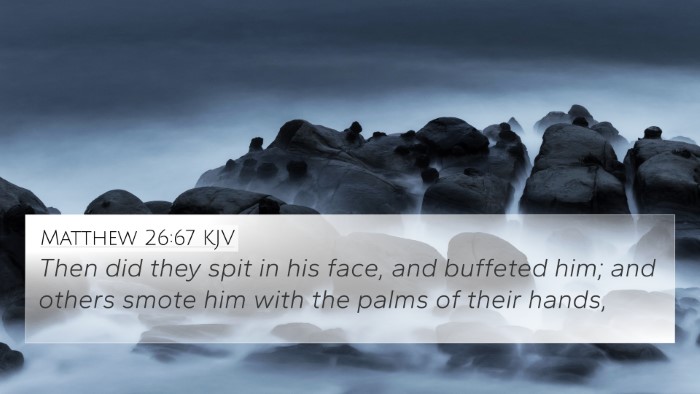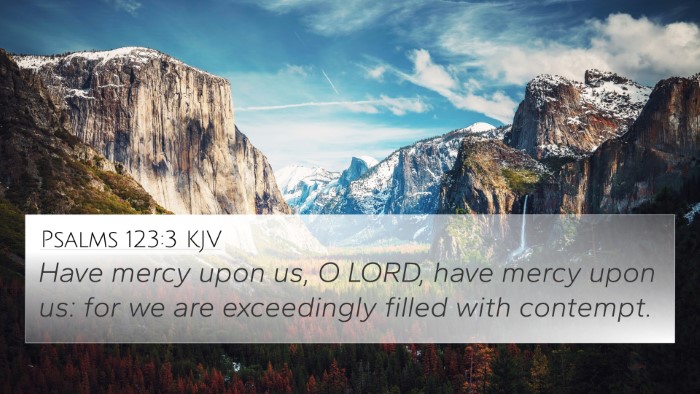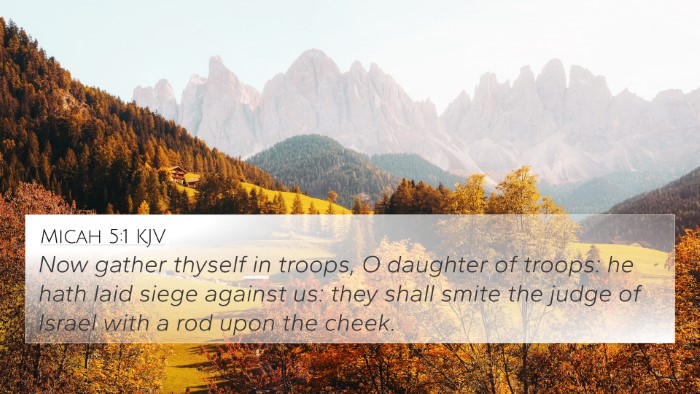Lamentations 3:30 - Biblical Meaning and Interpretation
Bible Verse: Lamentations 3:30
Verse: "Let him give his cheek to the one who strikes, and let him be filled with insults."
Overview of Lamentations 3:30
This verse unfolds a profound principle concerning humility and the rightful response to oppression or insult. The directive to "give the cheek" reflects an attitude of surrender and resilience amidst suffering. It emphasizes enduring injustice for a greater cause—spiritual integrity and peace. This perspective echoes throughout scripture, showcasing the profound themes of humility, suffering, and divine justice.
Commentary Insights
-
Matthew Henry’s Commentary:
Henry suggests that this verse expresses the spirit of patience and submission to the will of God. It highlights the virtue of endurance against wrongful treatment without retaliation. The act of offering one’s cheek symbolizes a willingness to endure suffering for righteousness, trusting that God will address injustices in time.
-
Albert Barnes’ Commentary:
Barnes emphasizes the theme of silent endurance and how the act of accepting insult reflects deep spiritual strength. He points out that such behavior is not a sign of weakness but of a profound understanding of one’s relationship with God. The verse reiterates the importance of responding to hate with love, which is a core teaching in both the Old and New Testaments.
-
Adam Clarke’s Commentary:
Clarke notes that this verse highlights the futility of retaliating against oppression. Instead, he indicates that believers are called to exhibit patience, comparing it to Christ's own response to his enemies. Clarke correlates this to themes of sacrifice and the Christian response to persecution, which ultimately leads to divine vindication.
Biblical Cross-References
This verse connects with several other scriptures that echo similar themes of suffering, endurance, and humility in the face of insult:
- Matthew 5:39: "But I say to you, do not resist the one who is evil. But if anyone slaps you on the right cheek, turn to him the other also."
- 1 Peter 2:23: "When he was reviled, he did not revile in return; when he suffered, he did not threaten, but continued entrusting himself to him who judges justly."
- Luke 6:29: "To one who strikes you on the cheek, offer the other also, and from one who takes away your cloak do not withhold your tunic either."
- Romans 12:19: "Beloved, never avenge yourselves, but leave it to the wrath of God, for it is written, 'Vengeance is mine, I will repay, says the Lord.'
- Proverbs 25:21-22: "If your enemy is hungry, give him bread to eat, and if he is thirsty, give him water to drink; for you will heap burning coals on his head, and the Lord will reward you."
- Isaiah 50:6: "I gave my back to those who strike, and my cheeks to those who pull out the beard; I hid not my face from disgrace and spitting."
- Matthew 10:16: "Behold, I am sending you out as sheep in the midst of wolves, so be wise as serpents and innocent as doves."
Thematic Connections
The themes found in Lamentations 3:30 find resonance within the broader biblical narrative, revealing various dimensions of faith amidst suffering. The verse's call for humility aligns with a greater scriptural dialogue on the nature of true power and authority within the Kingdom of God.
- Spiritual Humility: Across various scriptures, humility is seen as a virtue that God honors (James 4:10).
- Endurance in Trials: James 1:12 speaks of the blessing for those who persevere under trial, closely linking the message of Lamentations with New Testament teachings.
- Response to Persecution: The Beatitudes in Matthew 5 expound on the blessings associated with enduring persecution for righteousness.
- God’s Justice: The promise of divine justice (Romans 12:19) affirms that no wrong goes unnoticed, assuring believers they need not retaliate.
Conclusion
Lamentations 3:30 encapsulates a powerful message about the nature of suffering and the Christian response to it. By enduring insults and injustice with grace, believers reflect the heart of Christ. This verse encourages them to trust in God's ultimate plan and justice, echoing a deep theme found throughout scripture of relying on God's strength amidst adversity.












